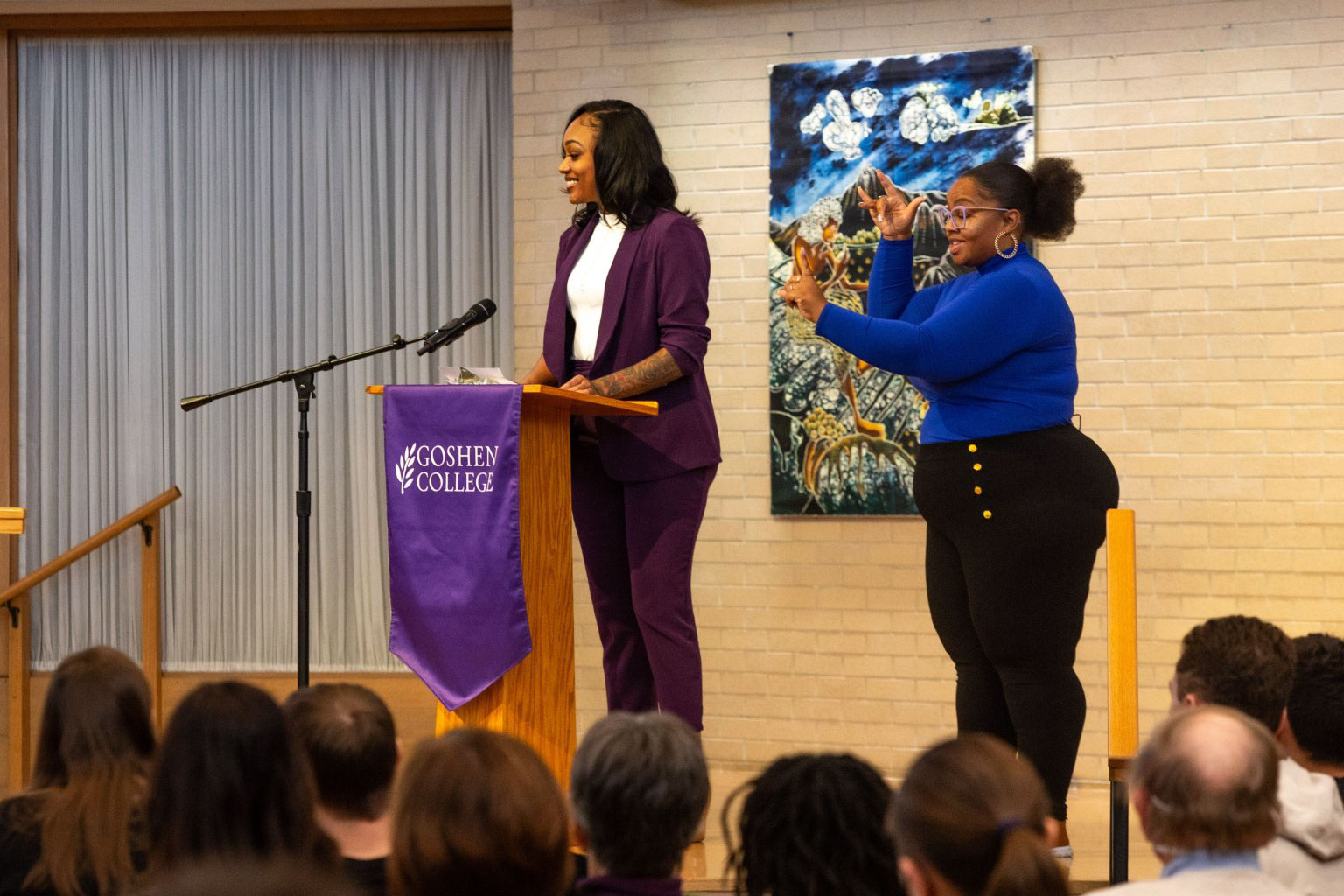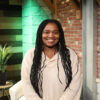Yalanda Allgood’s journey unfolds from a moment on a porch when she was 10 years old.
"At the end of the day, I am not dope just because I am Black, I am a dope person who happens to be Black."
— Yalanda Allgood
“One day, I saw her sitting there on the porch, and I’m like, ‘Wow, she’s there by herself,’” Allgood said. “I went up to her, and we went back and forth, pointing and learning signs out of a signing dictionary.”
This silent exchange is one of many reasons that American Sign Language is an important part of Allgood’s life. She reflects on these moments, recognizing them as “foreshadowing fragments” of an early attraction to diverse cultures and languages. This turned to an aspiration to become an international interpreter for the United Nations.
Despite having no formal affiliation with Goshen College, she interpreted for the MLK Day convocation on Jan. 15.
Allgood’s involvement for this event came from her connection with Diana Boussom, an ASL instructor and her classmate during their master’s program at Rochester Institute of Technology.
“It was very moving for me as a Black interpreter,” Allgood said. “To be around speakers who elucidated the whole goodness of Black power and Black girl magic — because it wasn’t just about Black people, it was about Black women.”
Colleen Geier, director of the sign language interpreting, Deaf studies and transition to interpreting program, said, “Yalanda not only did a great job interpreting, but she met with our students after convo and they were able to hear about the interpreting profession.”
Allgood traveled from Washington, D.C., to participate in the event. Currently, she embraces a range of opportunities, stating that she is, “open to it all.” Her primary expertise is in the medical field.
“I just finished doing an assignment that had to do with a dental extraction,” she explained. “They had three extractions done so I got a chance to be a part of that. … I’m usually a part of the teams when it comes to anything because I’m just as important to be there as far as communication.”
Allgood began her studies at St. Clair Community College in Dayton, Ohio, with an associates degree. She has also earned a bachelor’s degree at RIT in interpreting and ASL-English.
She is now on track to complete a master of science in healthcare interpreting this year.
At RIT, she mentors students and serves as an interpreting professor. On top of these roles, she holds a position as the director of interpreting services with “My ASL Teacher Rocks.”
In her role as director, Allgood emphasized a particular focus on representation within the organization.
“Black and brown interpreters that feel interpreting training programs don’t provide enough support from the standpoint of representation. We provide that extra support because as a person of color, woman of color, professional of color, especially in a predominantly white profession, we understand what that dynamic looks like.”
Beyond representation, challenges persist, with Allgood highlighting issues such as imposter syndrome. Being a Black woman in a predominantly white field adds another layer.
She says that questions such as, “Am I good enough to be in this space? Am I good enough to be around these people? Am I skillful enough?” are often a struggle.
Allgood realizes that “at the end of the day, I am not dope just because I am Black, I am a dope person who happens to be Black.”
Among other challenges, she pointed out the difficulty of gauging personal growth, and thinks of it as a “deliberate practice” that includes things like recording your work.
“If you’re always having a challenge, like ‘how did I sign this?’ — which is all interpreters — how do you know you made an improvement? There’s a whole process you have to think about.”
Allgood highlights numerous rewarding aspects of her profession, emphasizing the significance of addressing racial issues and serving as a role model for others.
“I am a trailblazer which means though there are others before me I am still a huge part of the ‘first timer’ to change,” she said. “I love my Black and I love my being a woman, so I feel I am double blessed. I have some hurdles of course but the reward is much greater.”
Allgood acknowledged the existence of adversities different from those of her non-Black and brown colleagues. However, she said, “If I did this just for me, I wouldn’t do it at all.
“I do it for the little girls and boys that look like me, so they can have a visual representation that you can be whatever you want when you grow up. We need more examples of successful representation in diverse fields such as this one.”




